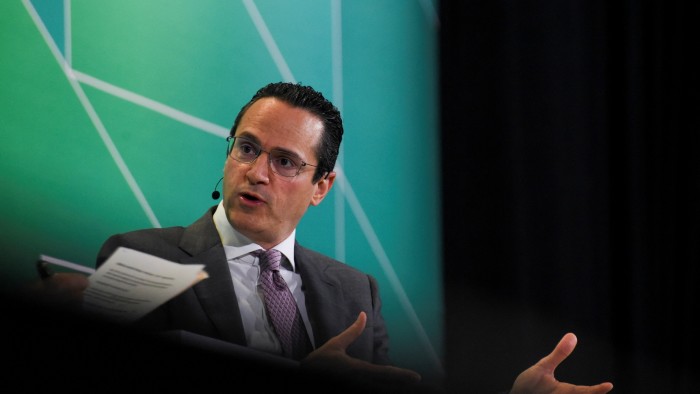Unlock the Editor’s Digest for free
Roula Khalaf, Editor of the FT, selects her favourite stories in this weekly newsletter.
A fifth of Shell’s shareholders have cast doubt on its strategy to become the world’s biggest supplier and trader of gas and LNG, questioning whether it makes sense from an economic or climate perspective.
Wael Sawan, chief executive of the UK-listed energy major, told shareholders at the company’s annual general meeting on Tuesday that “over the coming decade, we want to be the leading integrated gas and LNG player”. He added that Shell’s focus on gas would be its biggest contribution to the transition to cleaner fuels.
Shell has leaned heavily into gas, forecasting a 60 per cent increase in demand for liquefied natural gas over the next 15 years, driven primarily by Asia.
But a special resolution at the AGM, filed by three UK local authority pension funds and the Australasian Centre for Corporate Responsibility (ACCR), called for Shell to give more information on its LNG business and its spending on gas and asked how the goals were compatible with the company’s climate goals. The resolution won 20.56 per cent support from shareholders.
“We believe that shareholders still don’t have the information they need to properly assess the risks associated with this strategy,” said Sarah Brewin from ACCR at the AGM.
She claimed Shell had significantly more exposure to LNG than its peers, that Asia may find cheaper alternatives to LNG, and that Shell’s estimates for future demand may be affected if governments around the world introduce new emissions regulations.
Andrew Mackenzie, Shell’s chair, said he had not been surprised by the scale of the protest, and that it was in line with climate protest votes in previous years, which have ranged from 18 to 30 per cent of investors.
“I do not think there is a company that discloses more information on LNG than Shell,” said Sawan, at the AGM. He added that the company views gas as an essential part of the energy transition because it helps to displace coal and heavy fuel oils. “Actually, the biggest contributions to lowering CO₂ emissions have come from gas, both here in the UK, as well as places like in the US,” he said.
Sawan also argued that the increasing rollout of renewable energy will need more gas-fired power stations to back up electricity grids. “Otherwise the power cuts that we saw in Spain can materialise again,” he said. He added that Shell was working on ways of cutting its carbon emissions and to capture and store carbon dioxide to enable it to meet its net zero targets.
The size of the protest vote means the company will now have to hold a consultation with shareholders about its LNG strategy.
Shell said that the level of votes on the resolution required it to “explain what actions we intend to take to consult shareholders . . . and report back within six months”.
Mackenzie said the company would provide a “summary note” before its next AGM that “captures the multiple disclosures” that the company will make on the subject.
